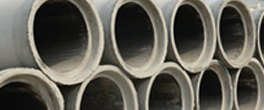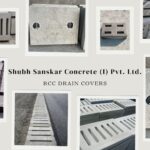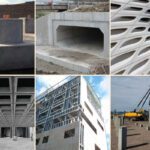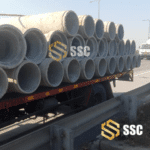RCC pipes, also known as Hume pipes, are a type of cement pipe used in various construction and infrastructure projects. RCC stands for “Reinforced Cement Concrete,” and these pipes are made by combining cement, sand, and aggregate materials with reinforcing steel bars. The resulting product is a strong and durable pipe that is resistant to wear and corrosion, making it an ideal choice for a variety of applications. In this article, we will learn about types of cement pipe manufacturing processes and how are RCC pipes made.
Manufacturing of RCC Pipes:
RCC pipes are made from a mixture of cement, sand, aggregate, and water, along with reinforcing steel bars. The mixture is poured into a mold and allowed to harden, forming a strong and durable pipe. RCC pipes are commonly used in the construction of pipelines, culverts, and other infrastructure projects. They are also used for sewage and drainage systems, as well as for irrigation projects.
Types of RCC Pipes Manufacturing Processes:
There are two main types of RCC pipes manufacturing processes: the vertical vibrated casting process and the spinning process.
Vertical Vibration Casting Process: The vertical vibrated casting process involves pouring the RCC mixture into a mould and allowing it to harden. In this process steel reinforcement cage is placed inside the moulds and then gradually concrete is poured in the vertical moulds while a vibrating table is place directly below it which helps in removing air pockets and ensure a smooth and uniform finish on the pipe while compacting the concrete mix. The vibration also helps to increase the strength and durability of the finished product. As the cement pipes are manufactured vertically, they are also called Verti- casted rcc pipes.
Spinning Process: The spinning process involves rotating a mould at high speeds while the RCC mixture is poured into it. Steel moulds are placed horizontally on wheels and the steel cage is placed inside the moulds. As the wheels starts rotating, the concrete mixture is poured inside the spinning moulds, due to centrifugal force acting towards the wall of the moulds the mixture starts taking the shape of cylindrical pipe. The rotation helps to distribute the mixture evenly and create a smooth and uniform finish on the pipe. Thus the name Spun Pipes.
The spinning process is generally faster and more efficient than the vertical vibrated casting process.
Advantages and Disadvantages of Both Processes:
The vertical vibrated casting process has the advantage of producing pipes with a higher strength and durability. However, it is a slower process and requires a larger amount of equipment and labor. The spun pipe manufacturing process is faster and more efficient, but the finished pipes may not be as strong as those produced using the vertical vibration casting process.
Regardless of the hume pipe manufacturing process used, RCC pipes are an important component of various construction and infrastructure projects. They are strong, durable, and resistant to wear and corrosion, making them an ideal choice for a variety of applications.
As a leading RCC pipe manufacturer, we use advanced technology and state-of-the-art equipment to produce high-quality RCC pipes for our customers. Whether you need NP2 RCC pipes, NP3 RCC pipes, or any other type of RCC pipe, we have the expertise and resources to meet your needs. If you’re looking for a reliable RCC pipe manufacturer near you, look no further than our company. With years of experience in the RCC pipe industry, we have established a reputation for delivering superior products and excellent customer service.
Contact us today to learn more about RCC cement pipes and how we can support your project.
For More Info Please contact us on:
Mail Us: shubhsanskarconcrete@gmail.com
Call Us: +91 99990 62399, +91 9810756705
Visit Our Website on: www.shubhsanskarconcrete.com
Follow on Facebook: https://www.facebook.com/shubhsanskarconcrete
Follow On Instagram: https://www.instagram.com/shubhsanskarconcrete/
Follow On twitter: https://twitter.com/shubhsanskarc
Follow On LinkedIn: https://www.linkedin.com/company/shubhsanskarconcrete/




